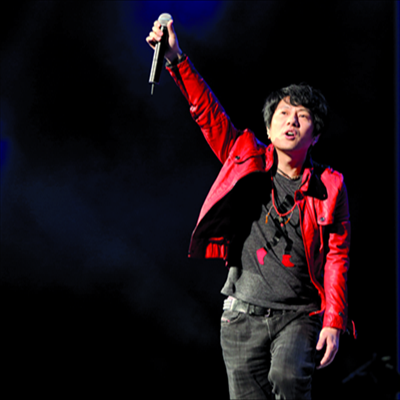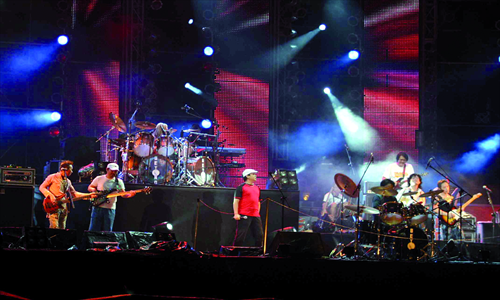HOME >> ARTS
Reviving Chinese Rock Music
By Lu Qianwen Source:Global Times Published: 2012-4-22 18:55:00

Chinese rock singer Zheng Jun


Black Leopard
Photos: CFP
Photos: CFP
A new documentary about contemporary Chinese rockers, Follow, premiered earlier this month. Chinese rock documentary films are not new, other films in the past include Zhang Yuan's Beijng Bastard (2003) and Post Revolutionary Era (2005), and Zhang Wanting's Beijing Rocks (2001).
Different from films that mostly focus on Chinese rock musicians and their music, Follow dives deeply into the genre's development in China. The band members featured in Follow are all real musicians living in Beijing, according to director Peng Lei. The director himself is the lead singer of the New Pants, one of China's favorite rock bands.
In Follow, Peng reaches his conclusion that perhaps Chinese culture is not conducive to rock music, despite the journey it has been through.
Founding father
Chinese rock, an alternative music genre, has experienced its fair share of sunshine and rain. Though popular since the 1950s in the United States and other Western countries, Chinese rock didn't take off until the 1980s.
In 1986, Cui Jian performed "Nothing to My Name," or "Yi Wu Suo You," in the 100-Singer Concert of Year of International Peace, at Beijing Worker's Stadium. Overnight, he shot to stardom, starting a rock movement. Through this song, Cui Jian became known as the founder of Chinese rock music.
After "Nothing to My Name," a handful of domestic rock singers and bands emerged, including Dou Wei, Zhang Chu, Zheng Jun and He Yong. Black Leopard, still a performing rock band, formed in 1987. Tang Dynasty, China's first heavy metal rock band, formed in 1988.
The splash of rock musicians in the early 1990s contributed to the variety of Chinese mainland live performances, previously dominated by pop singers from Hong Kong and Taiwan. Rock bands had plenty of performing opportunities each year.
"Between 1990 and 1992, we staged about 30 live performances a year. Our songs could be heard almost anywhere," said Zhao Mingyi, Black Leopard's drummer.
This soon came to a halt. According to Wang Xiaofeng, a cultural critic who tracks Chinese rock development, a government tightening on rock music in 1993 temporarily halted the market.
"At that time, rock bands performing in Beijing had to obtain a permission letter from the Beijing Municipal Bureau of Culture," Wang said.
Boundaries
Though the strict restrictions eventually loosened, rock music in China phased out in the late 1990s, coupled with other discouraging factors.
New rock songs were unable to reach popularity, the fan base was limited, and Chinese rock was generally not accepted by most people.
"In the early 1990s, rock musicians had classic hits. But younger generations in the late 1990s failed to produce work of the same caliber," said Wang.
It was rare that rock songs in the late 1990s could compare to the quality songs of their predecessor, like "Shameful" ("Wu Di Zi Rong") by Black Leopard, or "A Dream Return to Tang Dynasty" by Tang Dynasty.
A limited fan-base also stunted the genre's growth. "Rock fans are not part of the mainstream market, and they don't confine to societal boundaries," said Peng.
Cui Jian once remarked that though China has a population of 1.3 billion, no more than 130,000 people are fans of Chinese rock music.
Cultural clashes are another barrier, according to Peng. Westerners release their feelings directly. Chinese people tend to be more reserved, often suppressing feelings out of responsibility or other pressures.
"The dominant conservative culture shows that maybe Chinese people are not suitable for rock music, as this is a music genre that stands for liberated and liberal values," Peng said.
Jam on
Despite limitations, Chinese rock is moving forward. Though the golden period of the late 1980s and early 1990s has passed, recent years paint a more promising picture. With governmental support of the cultural industry, live performances and various outdoor music festivals, mostly rock music festivals, are in full swing.
On August 27, 2010, a rock concert, Back to Basics, was performed at the Beijing Workers' Stadium. The unprecedented star-studded cast included Cui Jian, Zhang Chu, Zheng Jun, He Yong, the Black Leopard, and the Tang Dynasty. The production cost of six million yuan ($952,800) was one of the highest figures spent on outdoor live shows then.
"It was the pinnacle for rock music, since 20 years ago," said Zhao, drummer of Black Leopard.
"In that year, we had about 30 live shows. Before 2010, many rock bands had no more than 10 shows per year. Since then, live performances have increased, signaling a small resurgence of rock music in China," said Wang.
"The rise of outdoor music festivals contributes to Chinese rock making a comeback," said Zhao.
Wang said that there are nearly 40 music festivals each year across the country, including the Midi Music Festival, Strawberry Music Festival, and Lijiang Snow Mountain Music Festival.
"The Back to Basics concert in 2010 boosted people's confidence in China's rock music scene." Benefiting from the government's support, rock musicians will hopefully receive recognition. "But there are still many issues Chinese rock will contend with in the future," Wang said.
Aside from the threat of digital music possibly replacing live shows, Chinese rockers face a new set of challenges, along with the old. How long can older generations of rock musicians stay around for? Can the new generation live up to expectations? Though the future is "rocky," many are hopeful.
Posted in: Music